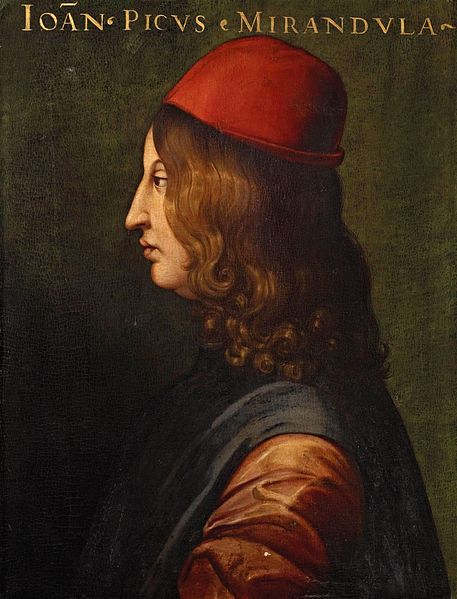Marsilio Ficino was an Italian scholar and Catholic priest who was one of the most influential humanist philosophers of the early Italian Renaissance. He was an astrologer, a reviver of Neoplatonism in touch with the major academics of his day, and the first translator of Plato's complete extant works into Latin. His Florentine Academy, an attempt to revive Plato's Academy, influenced the direction and tenor of the Italian Renaissance and the development of European philosophy.
Marsilio Ficino from a fresco painted by Domenico Ghirlandaio in the Tornabuoni Chapel, Santa Maria Novella, Florence
Corpus Hermeticum: first Latin edition, by Marsilio Ficino, 1471, at the Bibliotheca Philosophica Hermetica, Amsterdam.
Zachariah in the Temple (detail), a fresco by Domenico Ghirlandaio (1486–1490) in the Tornabuoni Chapel, Florence, showing (L-R): Marsilio Ficino, Cristoforo Landino, Angelo Poliziano and Gentile de' Becchi or Demetrios Chalkondyles
De triplici vita, 1560
Christian humanism regards humanist principles like universal human dignity, individual freedom, and the importance of happiness as essential and principal or even exclusive components of the teachings of Jesus. Proponents of the term trace the concept to the Renaissance or patristic period, linking their beliefs to the scholarly movement also called 'humanism'.
Giovanni Mirandola
Erasmus
Thomas More
Leonardo da Vinci's Vitruvian Man (c. 1490) shows the correlations of ideal human body proportions with geometry described by the ancient Roman architect Vitruvius in his De Architectura. Vitruvius described the human figure as being like the principal source of proportion among the Classical orders of architecture.[relevant? – discuss]








